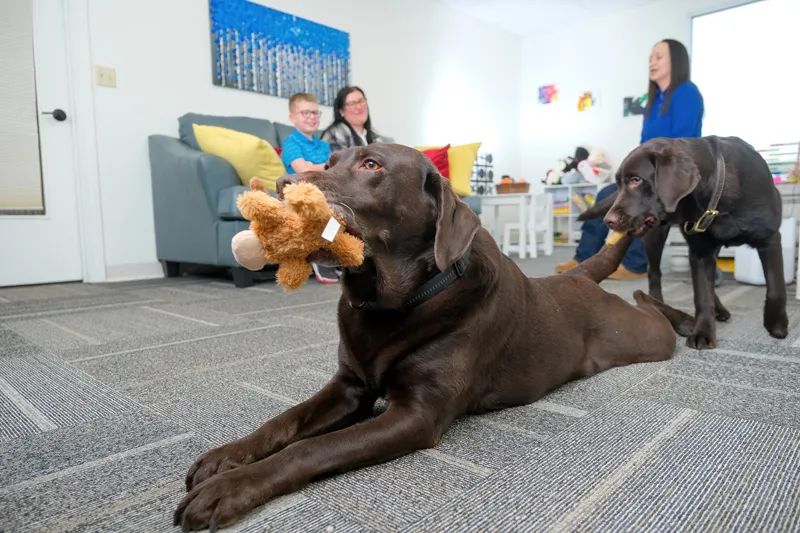
Paws for Thought
The healing pair of a therapist and her dog
In the fall of 2022, when Camden Lambert was nearly 6, his grandfather passed away suddenly.
One death is traumatic enough for a young boy, but that was just the start of a difficult time for the Billings youngster, his mother, Jennifer Lambert says.
“We had seven deaths in our family in 10 months, between family members and a coworker,” she says. “It was a nightmare.”
Many of the deaths were a result of old age, but they sparked in Camden severe anxiety that his parents didn’t know how to deal with. He asked to come home early from sleepovers with friends. He was nervous about going to school, and if his parents went out on a date, he became frantic.
“He couldn’t even go down to children’s church,” Jennifer says. “We were in the same building, but he didn’t want to be without us.”
She and her husband, Nick, turned to Karen Boe, a licensed marriage and family therapist in Billings with a unique set of tools, to help their son. Karen, who owns, Kid Counseling Montana, uses play therapy and pet therapy in her practice to help children heal.
Karen is one of just 43 people around the world certified through the International Institute for Animal Assisted Play Therapy, and the only one in Montana. She is also a registered play therapist.
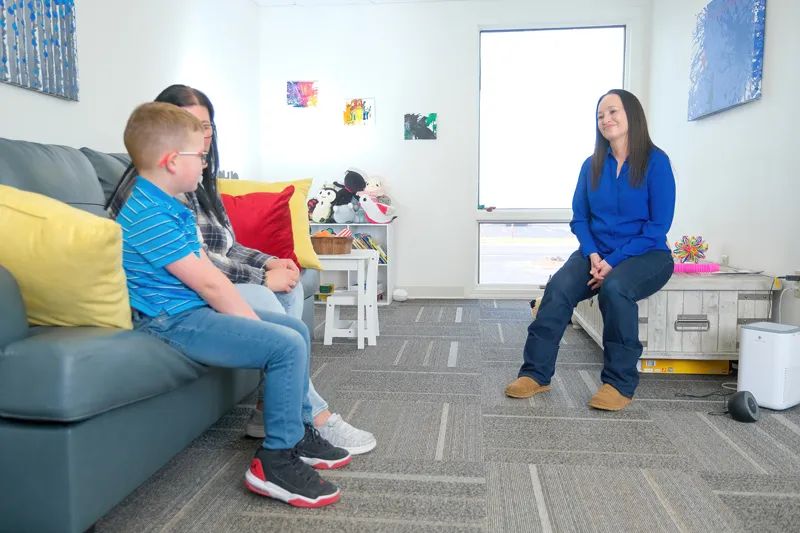
Though the IIAAPT doesn’t require therapy pets to be dogs, Karen has teamed up with Theo, a 7-year-old chocolate English Labrador retriever, who has warm brown eyes and a calm disposition. More recently, she acquired 6-month-old Bailey, also a chocolate Lab puppy, she is training to someday be a therapy dog.
Jennifer immediately saw the affect Theo had on her son.
“He would open up as Theo was there and he was petting and playing with him,” she says. “It got him to trust Karen, too. She was an OK adult to talk to.”
Over several months, using a combination of techniques that included pet therapy, play therapy and partnering with Jennifer and Nick, Karen was able to help Camden overcome his fear of losing the people close to him, to get back to his normal self. For Karen, helping kids overcome big problems in their lives brings great joy.
Her office is filled with toys on racks, a tray filled with sand, and the chocolate Labs who greet visitors and then flop down on the carpet to snooze. Like Camden, many of Karen’s young clients deal with anxiety. Some are working through trauma, and a smaller percentage have mood disorders. She adapts the therapy to the individual client.
It’s no surprise that animals play an integral part in Karen’s practice. She grew up on her family’s sheep ranch in McLeod, feeding chickens, retrieving eggs and, as she got older, milking the cows. In 4-H, she rode in equestrian events on her horse, Zanbar, who gave Karen her first taste of how intuitive animals can be.
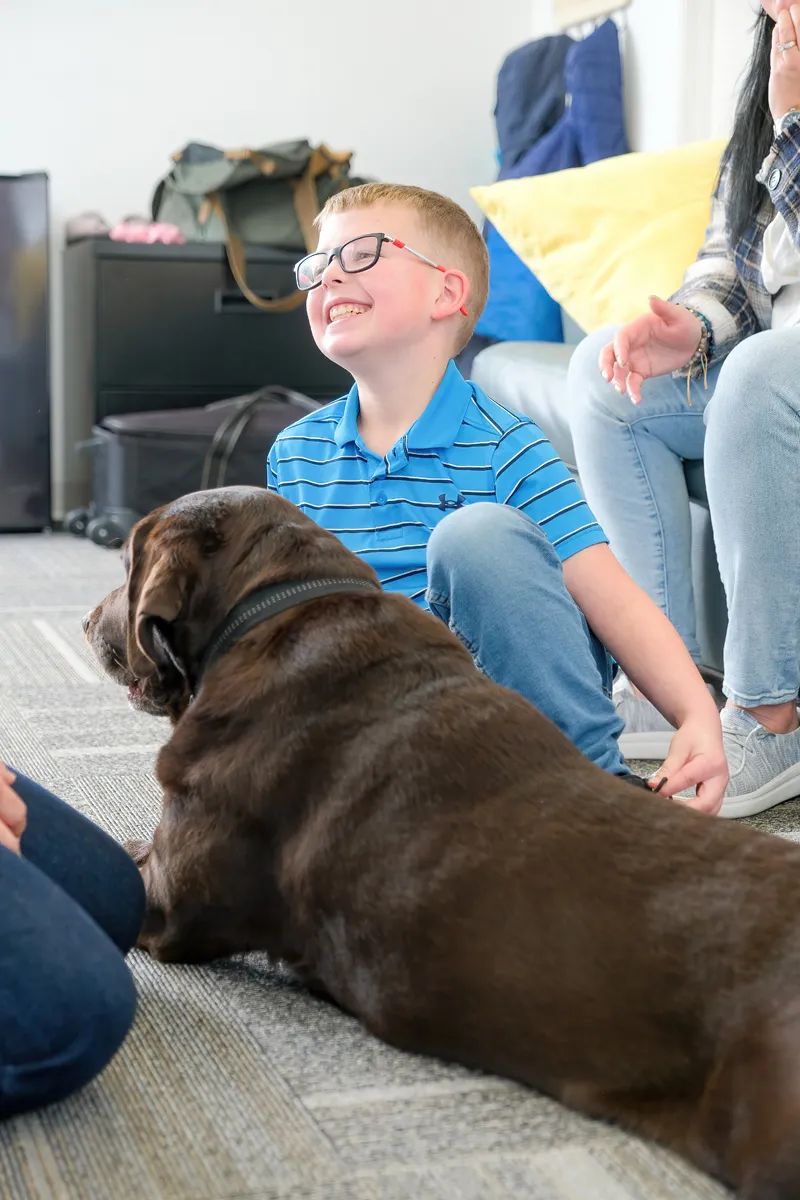
“I had such a good relationship with him, I could look a certain way and he’d go that way,” she says, much as Theo does now.
Karen completed a psychology degree in 2000 from George Fox University, then began work on completing a master’s degree in marriage and family therapy. While there, Karen got her first exposure to play therapy.
She took a couple of classes from Dr. Daniel Sweeney, one of her professors, who was a certified play therapist, and, she says, “that’s where I fell in love with it.”
“The idea is that you provide items and toys for the children to be able to talk to and work out things at their development level,” Karen explains. “So, the toys actually become words.”
In a safe environment, a child uses the natural urge to play as a tool to freely express what they are feeling, good or bad. It can be the start of a healing process they do at their own pace. The technique can help children wrestling with everything from abuse and neglect to grief and behavioral disorders.
In 2004, a family connection drew Karen to the Sacramento area of California, where she spent 15-plus years working with children and adolescents ages 5 to 18 in schools and, later, in foster care.
During that time, separate from her work, Karen connected with Lyla Tyler, a registered play therapy supervisor. Under Lyla’s guidance, Karen earned her registered play therapy credential in September 2018, fulfilling a long-held dream. She joined Tyler’s practice, Kid Counseling Sacramento, then in 2021 moved to Billings to open her own office and live closer to her immediate family.
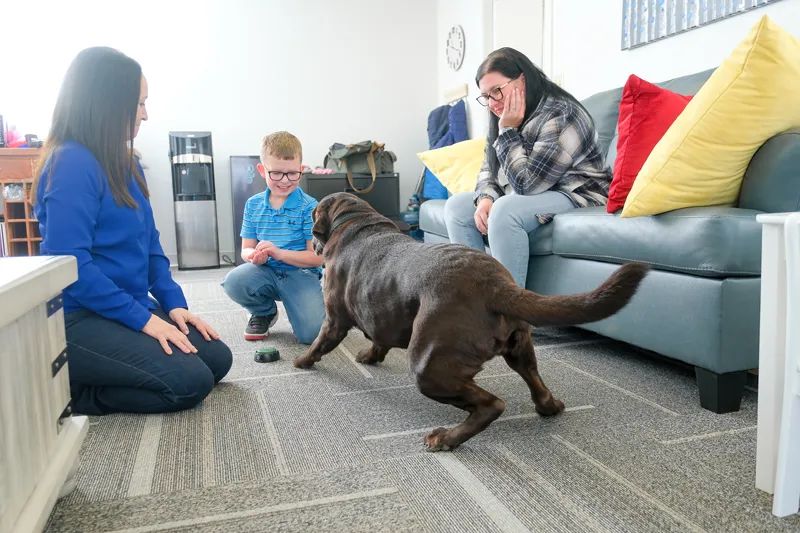
How pet therapy became part of her practice is a much more personal story. In 2013, Karen was doing a home visit with a student whose family owned a pit bull, one that had just had a litter of puppies. The dog, protective of her brood, walked up to Karen, and after smelling her proffered hand, lunged at her and bit her in the face and neck, seriously injuring her. The attack didn’t just leave her with physical scars.
“I was really having lots of pretty severe trauma symptoms,” she says, including sleeplessness, nightmares and hypervigilance, constantly checking for potential threats. After dealing with that for 2½ years, “I was at a really low point in my life.”
Karen worked at a high school with a staff that included a school psychologist, Linda Atwater, who happened to be helping a friend raise a golden Lab named Tug as a service animal. Karen visited Linda and Tug at Linda’s house and something clicked inside her wounded soul.
“I just wanted to go there and lay down with the dog all day,” she remembers. “It felt so amazing.”
Just petting a dog can lower the body’s level of the stress hormone cortisol. “There’s something about having a dog there and being able to pet them that can be very regulating,” she says.
Karen wanted that in her life. Through a series of events, she was paired with Theo, a 10-month-old service dog trainee, in early 2016. The two have been inseparable ever since. “He just made the world safe for me again,” Karen says. “I took him everywhere I went.”
That included to the schools where she worked. As much as he helped Karen, she saw Theo work his magic on the youngsters she counseled who were dealing with their own issues.
He earned his Canine Good Citizen in 2017 and was registered through Pet Partners as a therapy dog from 2017 to 2021 before he earned his Animal Assisted Play Therapy certificate.
“Both Theo and I are certified, which means he had to demonstrate specific qualifications as well as I as his handler,” she says.
The training is rigorous, requiring two 40-hour sessions. And then candidates must practice under supervision before they receive their certification.
As serious as this all is, there are moments of fun. As part of the training, Karen had to prove she could teach Theo a new skill. During an interview, at her behest he demonstrated, his ability to plunk notes on a Playskool piano with his nose. A moment later, Karen blew up a balloon and let Theo nudge it into the air with his nose before he eventually popped it. He can push buttons with his nose and he loves playing with balls.
“He’ll literally throw the ball back at you,” Karen says.
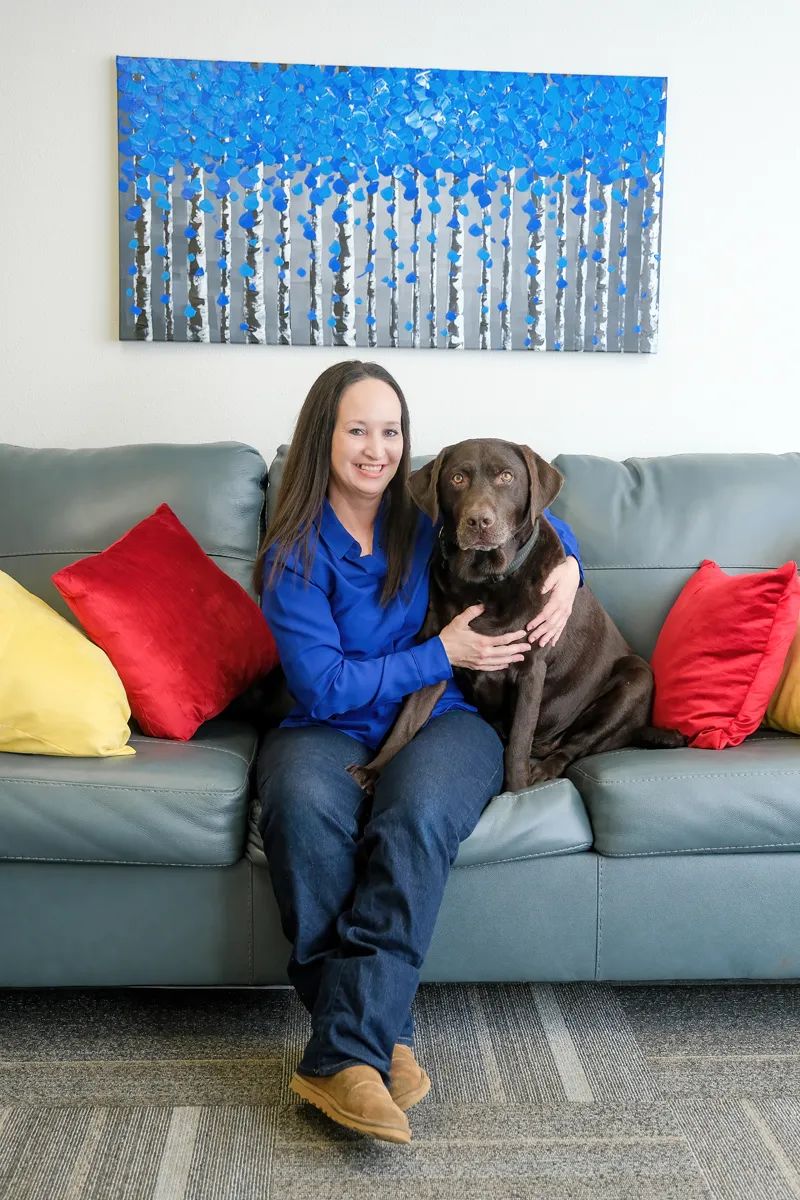
Whether he takes part in a therapy session is pretty much up to the client, she says. But over and over, in different ways, she has seen Theo help with the same kind of healing she once experienced.
There was the 4-year-old boy who had been severely neglected, then was adopted by his foster parents. When it was time for him to enter preschool, the child sat in the midst of 20 other youngsters, completely overwhelmed.
“Theo would lay on his stomach and he would belly crawl up to him and just put his head in the little guy’s lap,” she says. “And it was just priceless.”
Another little girl, who had suffered severe medical trauma, would use a toy doctor kit to bandage Theo, putting play band-aids all over him, taking his temperature and wrapping up his feet, while he patiently lay down next to her.
“She was reenacting what had happened to her,” Karen says. “What you find is that children will play out and reenact a trauma until they’ve processed it, and then they’ll move on.”
And then there was the boy who had been in and out of foster placements and suffered ongoing trauma. He didn’t have much trust left in humans. Karen started taking him and Theo for walks to a park twice a week, playing and not talking much about the issues he was dealing with.
“And what I found was that he really developed a closeness with Theo and started to be really mindful that Theo was safe,” Karen says.
The boy was attentive to the environment, making sure Theo didn’t wander into any dangerous situations. And along the way, the bond he forged with the dog paved the way for him to reconnect with humans.
“He went from being a child who could barely make it in the classroom to transitioning back into school after that summer, and he was good,” she says. “He didn’t have hardly any behavioral problems after that.”
Witnessing this growth, Karen says, is emotional.
“Watching them not be afraid to connect and to be able to say, ‘I can be OK,’ I don’t even know if I have the words,” she says, sitting in her Billings office. “It’s so powerful, so beautiful to see.”
TO LEARN MORE about Karen Boe and the work she does with Theo, visit kidcounselingmontana.com











